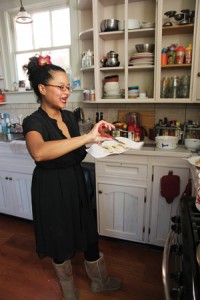
Photo by Elsa Hahne
Korean food is a lot of little dishes, basically tapas, but they call it banchan. You have your bowl of rice and then all around you are all the little side dishes, one of which is always kimchi. And you’re picking, you share, it’s communal. Another dish is bean sprouts, which is called kohng namool. Basically it’s mung bean sprouts or green bean sprouts. Also spinach, which is called shigumchi namool. I did not make kimchi today because it takes a little longer. I buy it from the oriental market on Transcontinental in Metairie, right off Veterans, a wonderful Korean grocery store. Hong Kong Market [on the West Bank] is wonderful too, but it’s pan- Asian. The store on Transcontinental is the only exclusively Korean grocery store. They used to have two. There was one over on Severn, but post- Katrina that’s gone. Korean food is spicy. And the fermentation, a lot of people don’t like, but I love it.
Today I’m making—we grew up calling them egg rolls, but they’re essentially gyosa—it’s a wonton wrap with a meat filling, and the Korean word for that is mandu. But growing up, my mother always just called them egg rolls. We’d all sit around the kitchen table helping her fill them. In Korean stores, you’ll find square wrappers. This week they were out, they only had them in rounds. But I cut them. Don’t tell anybody. A Korean egg roll is going to be a triangle, rather than the crescent shape, which is more Japanese or Chinese. Traditionally, the filling is either ground pork or ground beef, or a combination. My mother always used beef.
I don’t make this with my daughters yet, but I imagine I will when they’re older. For kids, this is endless fun. For adults, it might be perhaps a little monotonous. But I remember being a child and having hours of fun filling these. It was a community project, a
family project. It never seemed like cooking was work. It was me and my mom and my sisters, they’re a little bit older, and my mom’s best friend, and she had a daughter my age so we grew up together.
My mom and her girlfriend would always get together, every weekend. They’d cook, and then we’d sit around and watch them cook,
help them cook. I remember very distinctly, sometimes not wanting to be there, because you’re young and you want to run around, and I remember her telling me, she was very emphatic, ‘I want you to watch what I’m doing. I want you to learn these recipes, because you can take this with you forever, and then you will teach your daughters.’ I didn’t know the value of that then. Young, you don’t know, but now that I’m older and I have my own children and she’s passed away, it resonates. I always will remember that, I’ll always be grateful to her for making me stand there and watch because you keep a part of the ones you love through cooking and by passing this down to your own children. I regretted her not teaching me the language, but I will forever be
grateful for her teaching me the cooking because that way I feel close to her.
My mom passed away in ’04 here in New Orleans. She came down to live with me in ’01. We lived on Royal. I’m really happy that she had a chance to experience New Orleans before she passed away because now this is my home and I’m not going anywhere and now it’s my daughters’ home.
I try to do a Korean dinner where we invite friends over a few times a year, especially around the holidays, whenever there is family in town. And John [Rodli, my husband], before my mom passed away, he got to know her and she actually started teaching him how to cook Korean. After I’d go to bed, they’d stay up and cook. She taught him how to make kimchi soup, kimchi jjigae. He’s become quite the Korean chef.
I never met my Korean grandmother, she never made it over to the States. She passed away when I was 10. But when I was born, she told my mother that I would be a singer, without ever having met me.
After I moved here I found out that my father’s mother was from Tallulah, Louisiana. Something was drawing me here. The last ten years of my life, I’ve connected the dots and everything has tied together around the women in my life.”
Miss Sophie’s Korean Eggrolls
Koreans don’t distinguish between breakfast, lunch or dinner, so you can serve these whenever you like.
1 package small, square wonton wrappers
1 cup mung bean sprouts
1 pound ground beef
1⁄2 teaspoon salt
1⁄2 onion, chopped
2 green onions, chopped
3 cloves garlic, chopped
1 tablespoon minced fresh ginger
1 tablespoon sesame oil
1 egg
Defrost wonton wrappers, if frozen. Blanch bean sprouts by dunking them briefly in boiling water. Let sprouts cool, then chop. Mix with beef and all other ingredients (except wontons). Place one teaspoon of filling in the middle of each wrapper, wet edges with water and fold wrapper over to form a triangle; pinch to close. Fry in vegetable oil on both sides until golden and crispy. Serve immediately.
Dipping sauce
This sauce can also be used as a dressing for side dishes such as blanched bean sprouts or blanched spinach.
2 green onions, chopped
2 cloves garlic, chopped
2 tablespoons Kikkoman soy sauce
1 tablespoon sesame oil
1 tablespoon roasted sesame seeds
1 teaspoon red pepper flakes
Stir everything together and serve.



